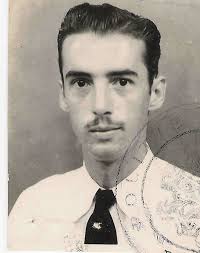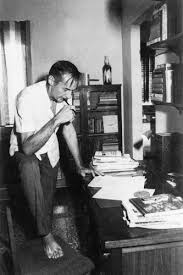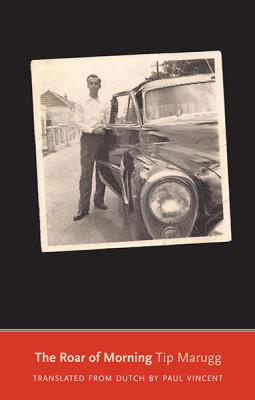First published in 1988, Tip Marugg’s novel The Roar of Morning comprises just two and a half hours in the life of its unnamed narrator. But it conveys a lifetime of brooding on the beauty and desolations of life in the Caribbean. At thirty minutes past midnight, a man sits on his garden terrace alternately sipping whiskey and swigging beer, gazing down toward Curaçao’s coastline and across the water to Venezuela. His pronouncements lead to the story’s fateful end at three in the morning:
 “Drink the great healer; the treacherous quack. I’m well aware, even when drunk, that what I’m so eager to clasp to my bosom may be no more than a temporary illusion. An adult can never become free again – he can never shake off the impure things that have attached themselves to his life with their suckers. There is no way back. But I drink, and in my brief intoxication allow myself to be carried back to a period when my life was not yet withered. Otherwise I should have to content myself with the implausibly calm existence of a naïve old man who thinks he should be happy because no great catastrophes have befallen him.”
“Drink the great healer; the treacherous quack. I’m well aware, even when drunk, that what I’m so eager to clasp to my bosom may be no more than a temporary illusion. An adult can never become free again – he can never shake off the impure things that have attached themselves to his life with their suckers. There is no way back. But I drink, and in my brief intoxication allow myself to be carried back to a period when my life was not yet withered. Otherwise I should have to content myself with the implausibly calm existence of a naïve old man who thinks he should be happy because no great catastrophes have befallen him.”
But catastrophes lurk everywhere – just as redemption is promised in the hour of peace. The man is prepared for both eventualities. There are “accursed, shambling creatures” prowling the night, morphing into a “nocturnal paradise” in the next moment. There is the hellfire and grace of the Protestants (our man is white and attended a religious school as a child) – canceled by erotic desires. There are also the beliefs and lore of the Curaçaoans. He says, “There has never been a night so perfect for undergoing a cleansing baptism. Or for dying.” Where is he taking the reader? This is a world where everything happens at once, an a-linear time that wrests history within it.
It is a world of black people and white people, but displacement and loss overshadow the recognition of difference. He says, “It is not the Jew but Caribbean Man who is the most tragic figure on earth. His destination is not Auschwitz but Disney World. He lives in hiding, even though the colonial occupation ended long ago. He suffers from night blindness and cures himself by spending the whole day in the sun. His life, a feast of laughing and dancing, is actually a lament, intoned to the sound of calypso, reggae or merengue: his mistrust is fed by skepticism about the likelihood of happy endings . . . The white man isn’t white and the black man isn’t black; both are aliens in this land where their umbilical cords are buried.”
 This most certainly was Marugg’s own sensibility. Silvio Alberto “Tip” Marugg was born in 1923 in Willemstad, Curaçao where his Swiss Protestant family had settled in 1804. Although Papiamento was his native tongue, he wrote his three best known novels in Dutch, the island’s official language: Weekend Pilgrimage (1957), In the Streets of Tepalka (1967), and The Roar of Morning (1988). After military service, Marugg worked in Shell Oil’s publicity department, resigning at age 47 to write and live his rather solitary life. He wrote poetry, published a dictionary of erotic terms in Papiamento in 1992, and was nominated for Dutch literary prizes.
This most certainly was Marugg’s own sensibility. Silvio Alberto “Tip” Marugg was born in 1923 in Willemstad, Curaçao where his Swiss Protestant family had settled in 1804. Although Papiamento was his native tongue, he wrote his three best known novels in Dutch, the island’s official language: Weekend Pilgrimage (1957), In the Streets of Tepalka (1967), and The Roar of Morning (1988). After military service, Marugg worked in Shell Oil’s publicity department, resigning at age 47 to write and live his rather solitary life. He wrote poetry, published a dictionary of erotic terms in Papiamento in 1992, and was nominated for Dutch literary prizes.
The Roar of Morning gently sways from the shadowy insights of a dark night to sharply drawn memories of growing up – including the death of one named Fernando during the 1969 uprising in Curaçao. The violent events were triggered by a labor dispute underscored by racial discrimination and disproportionate poverty suffered by the island’s black population. Dutch marines arrived to enforce order. This chapter, late in the novel, is preceded by descriptions of birds that the narrator believes commit suicide: “Each time I witness it this spectacle seems absurd. Firstly there is the contradiction of the magnificent birth of a new day and the suicide of the birds … Then there is the abrupt way in which the birds about to crash break off their aggressive screeching at the sun, without leaving so much as an echo.” Marugg insists on allowing all of these disasters, natural and political, to resonate together.
 Marugg’s original title for the novel was The Destruction of South America. Five hundred years of history – fratricide, colonialism, exploitation – are leading to an apocalypse. In the end, his narrator aligns his fate with the hellish end of the world, predicted by both his preacher grandfather and the myths of the people.
Marugg’s original title for the novel was The Destruction of South America. Five hundred years of history – fratricide, colonialism, exploitation – are leading to an apocalypse. In the end, his narrator aligns his fate with the hellish end of the world, predicted by both his preacher grandfather and the myths of the people.
Tip Marugg drew from several traditions – the magical realism of South America, the cool psychological edge of European literature, and the Papiamento-speaking storytellers of Curaçao. But his novels are unmistakably his own. As his talented translator, Paul Vincent, remarks in an afterword, Marugg was “first and foremost a highly original, visionary writer and an accomplished stylist.”
[Published October 15, 2015. 132 pages, $16.00 paperback. A Margellos World Republic of Letters book.]